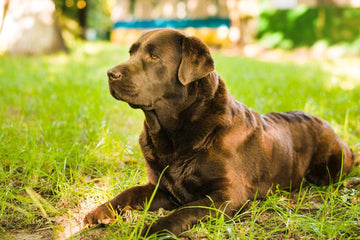
Dogs have a way of turning everyday activities into fun adventures. From zooming around the yard to rolling in the grass, they bring much joy and, sometimes, a bit of chaos to our lives. However, on some occasions, their fun isn't exactly enjoyable for pet owners—like when they start digging holes in your lawn. This is particularly frustrating for fur parents trying to maintain a healthy, green lawn.
While it's natural for dogs to dig occasionally, this behavior can sometimes signal an underlying issue or unmet needs. At Gotta Go Grass, we understand the importance of building a solid relationship between you and your furry friend and the frustration over a lawn full of holes. Our pet-friendly solutions, like grass pee pads for dogs, aim to make it easier to manage bathroom breaks and protect your lawn from pet-related damage.
In this article, discover why your dog might be digging holes and provide practical tips to stop the behavior.

Why Your Dog is Digging Holes in Your Yard
Digging is a natural behavior for many dogs, often rooted in their instincts to explore and hunt. However, if it becomes a frequent habit, it not only damages your lawn but can also be a sign of deeper behavioral or environmental issues.
Boredom: A bored dog is more likely to start digging. Dogs are curious creatures that need regular physical exercise and mental stimulation. Without enough activity, your dog may dig holes to entertain itself and burn off excess energy.
Seeking Food or Shelter: Some dogs dig to find hidden treats or small burrowing animals like moles and rabbits. Dogs may also dig holes to find a cooling spot, particularly on a hot day, to regulate their body temperature. This is more common for dog breeds with thicker coats, like Golden Retrievers.
Escaping or Protecting Territory: If your dog digs near the fence or around specific areas, they may be trying to escape or defend their territory. They might dig to get out of the yard, chase after other dogs, or protect their space from unfamiliar animals or people.
These motivations can trigger a dog to dig more frequently. By recognizing the cause, you can provide an appropriate solution or outlet to manage the behavior.
How to Stop Your Dog From Digging the Grass
Check out some strategies to help your dog stop digging.
Engage in Regular Exercise
Many dogs dig because they aren’t getting enough physical exercise. Make sure your dog gets daily walks, playtime, and trips to the dog park to expend pent-up energy. Regular exercise can significantly reduce boredom and help prevent your dog from engaging in destructive digging behavior.
Provide Plenty of Mental Activities
Keep your dog mentally stimulated with interactive toys such as puzzle feeders and treat tumblers. These toys challenge your dog’s mind, making it less likely to dig out of boredom. Adding mental activities to their daily routine can help shift your dog’s focus away from digging.
Teach Your Dog Commands
Training your dog to obey commands like “leave it” or “no dig” can help redirect their attention away from digging. Use positive reinforcement techniques to reward your dog when it refrains from digging. If you’re unsure how to train your dog or if it has a persistent digging habit, consider engaging a dog trainer for professional guidance.
Supervise Your Dog When in the Yard
Monitoring your dog’s outdoor activities allows you to quickly interrupt any digging behavior. This will also enable you to correct the behavior in real-time and reinforce positive actions.
Redirect Bathroom Breaks to Grass Pads
If your dog is prone to digging while outside, consider temporarily reducing their outdoor time during training. In these situations, Gotta Go Grass offers an excellent solution by providing an alternative for bathroom breaks. These pads can be placed indoors or on a balcony for convenience and accessibility. Using grass pads as your dog’s primary bathroom spot can also protect your lawn from additional pet-related damage, like urine spots, helping maintain a healthier yard overall.
Provide an Alternative
Create a designated digging zone or a dig pit in your yard where your dog is allowed to dig freely. Fill a sandbox or a designated area with soft soil, sand, or mulch, and bury toys or treats in the spot to encourage your dog to dig there instead. This provides an outlet for your dog’s digging habits while protecting the rest of your yard.

Repairing the Damage
If your lawn is already showing signs of damage from your dog’s digging, consider using sod or grass plugs to repair the affected areas. This can also be an opportunity to switch to a more pet-friendly grass variety, such as bermudagrass, better suited to handle heavy foot traffic and wear and tear caused by active dogs.
Conclusion
The solution to your dog’s digging problem isn’t to keep them out of the yard altogether—it’s about understanding the reasons behind the behavior and providing positive outlets. With consistent training, proper supervision, and engaging activities, you can create a balanced environment that keeps your dog and lawn happy and healthy.
Remember, addressing a digging habit doesn’t happen overnight. But, with understanding and persistence, you can help your dog stop digging and transform your yard into a well-maintained outdoor space.




